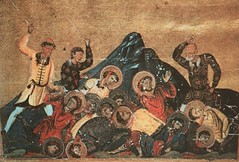Our Pagan World
Most of the Pagan community has read many articles regarding the “borrowing” of certain holidays and yearly traditions by modern society. We have heard that the December 25th birthday of Jesus was taken from Mithras, and we know that Easter was originally Eostar or Ostara, a spring fertility festival. Groundhog’s Day falls on Imbolc, and both holidays involve an animal predicting the coming spring. Even our modern secular traditions of grilling out and shooting off fireworks could be linked to the ancient fire festivals held in summer. It is our natural human tendency to give thanks for the harvest in the fall, be it with Thanksgiving turkey or Lammas bread. But is that it? Do our Pagan roots extend only to the days we celebrate?
To Pagans, it may seem that we live in a world that is not accepting of our religion, and in many cases seems to be at odds with our beliefs. Certain groups in society denounce the pagan origins of celebrating Halloween, and may even go so far as to ban their children from dying Easter eggs. While that is of course their right to make that choice, the Pagan influences on every day life go a bit deeper than most people realize. This is especially obvious when looking at the origin of some of our common words. Few people realize that in their every day speech, they may use words of Pagan origin and not even know it. Take this simple sentence for example: “This morning I woke up after a night of insomnia and had a bowl of cereal.“ There are two words in this sentence that have Pagan origin. If you had a bowl of cereal this morning, thank the Goddess! “Cereal” comes from Ceres, Roman counterpart of Demeter, Goddess of agriculture, harvest and grains. “Insomnia” comes from
